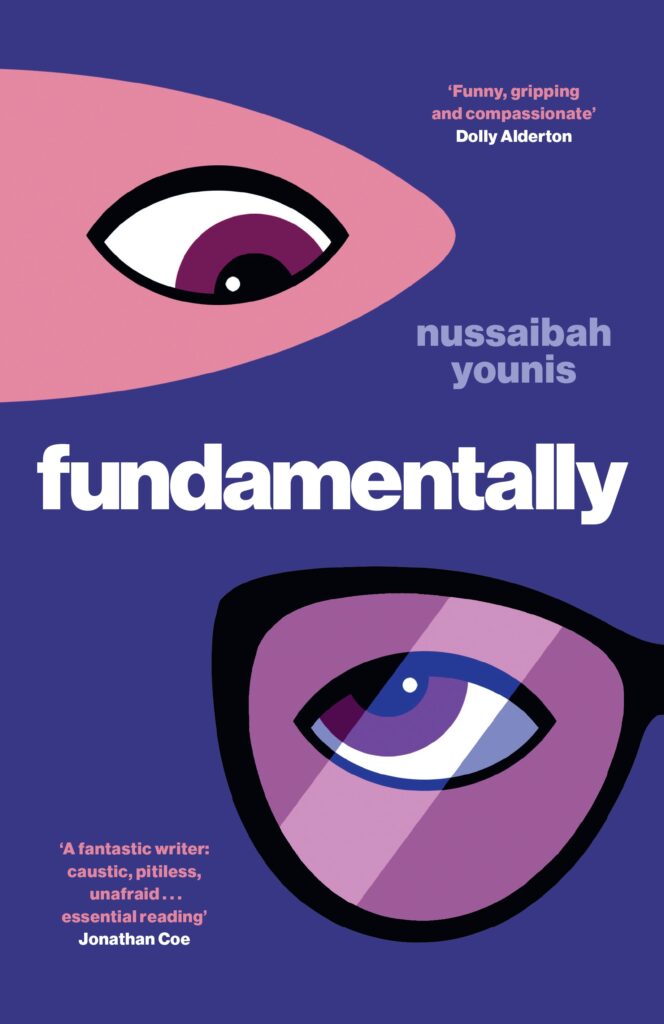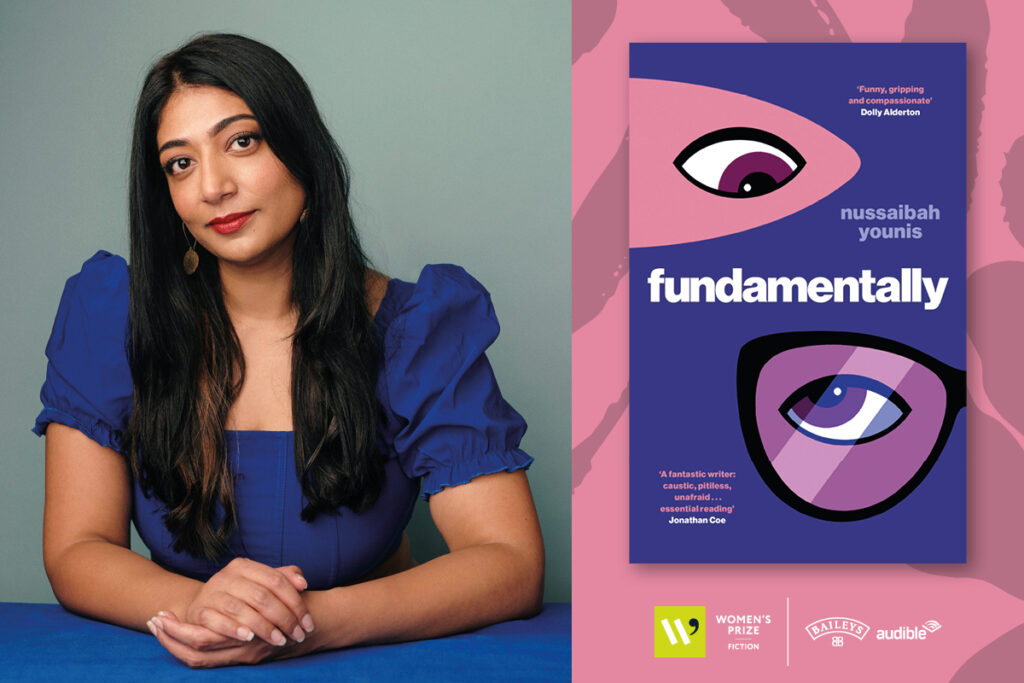Fundamentally by Nussaibah Younis is a sharply observed satire on aid workers in Iraq.
Shortlisted for the 2025 Women’s Prize for Fiction, chair of judges Kit de Waal says: ‘Funny, irreverent, clever and shocking, this is a story of what happens to a young woman who is groomed into fundamentalism abroad, and more importantly what happens when she wants to come home. It’s a fascinating peak behind the curtain of the UN, told with wit, insider knowledge and is definitely not what you expect.’
To find out more about the book we spoke to Nussaibah about her inspirations, writing process and favourite books.
How would you describe your book to a new reader?
Fundamentally is a dark comedy about an ill-fated UN program to de-radicalise ISIS brides. The novel follows Nadia, an academic who’s been disowned by her puritanical mother and dumped by her lover, Rosy. She decides to make a getaway, accepting a UN job in Iraq. Tasked with rehabilitating ISIS women, Nadia becomes mired in the opaque world of international aid, surrounded by bumbling colleagues. When she meets Sara, a precocious and sweary East Londoner who joined ISIS at just fifteen, Nadia is struck by how similar they are. Both are feisty and opinionated, from a Muslim background, with a shared love of Dairy Milk and rude pick-up lines. A powerful friendship forms between the two women, until a secret confession from Sara threatens everything Nadia has been working for. Fundamentally is a bitingly original, wildly funny, and razor-sharp novel about love, family, radicalism and the decisions we make in the pursuit of connection and belonging. With heart, complexity, and humour, it upends one of the defining controversies of our age.
What was the idea that sparked your novel?
Fundamentally draws on my personal experiences as a British-Iraqi-Muslim, as an NGO worker in Iraq, and as an expert tasked with creating a de-radicalisation program for ISIS brides. Here is my story. Like a million others, I marched against the invasion of Iraq, the year before I started university. But it was more personal for me. The country of my birth was invading the country of my forefathers; I had to do something. So, I studied Arabic, read a lot of books, got a PhD. Then I went to Iraq. The trouble is, having an Iraqi father did not make me Iraqi, and having a PhD did not make me competent. I was just another idiot foreigner; well-meaning but totally out of my depth. I spent ten years as an NGO worker, trying to ‘save Iraq.’ I lived an insane life, pursuing hair-brained schemes to ‘build peace.’ My naivety shone like a spotlight as I played out my brown saviour fantasies, all the while being mocked and extorted by locals. Before long, I was embroiled in the farcical humanitarian sector. I’d started out by asking: how can I help? But soon I was asking: how can I maximise my budgets? How can I curry favour with corrupt Iraqi ministers? And how can I screw over my rivals? As a workplace, humanitarianism is as aggressive as investment banking, except that lives hang in the balance. That didn’t stop us from drinking hard, fucking around harder, and telling the darkest jokes known to mankind. It’s a stressful place, failure is a given, and we did what we could to feel alive (though some of us wound up dead.)
Then, the Iraqi government asked me to design a de-radicalisation program for ISIS women. That’s when things got really personal. As I visited refugee camps and met the women who’d been swept into ISIS, I realised just how easily I could have been on the other side. In 2003, just after the invasion of Iraq, I attended a Muslim summer camp taught by Sheikh Anwar al-Awlaki. He was a smart, articulate and charming scholar who spun compelling narratives about the suffering of Muslims at the hands of imperial powers, about our duty to defend the defenceless. Listening to his words, and watching the bombardment of Iraqi civilians, I became very religious, convinced I could save the world by following God’s plan. I was a teenager, and my half-formed brain embraced the simplistic morality, revelling in the centrality of my potential role. Anwar al-Awlaki later joined Al-Qaeda. Had it been that summer, I may have gone with him. Instead, I grew up. I went to university, read widely, befriended people with totally different perspectives, and grew to appreciate the mad, unknowable and irreducible complexity of the world. And I realised that some terrorists masquerading as freedom fighters are actually barbaric misogynists motivated by blood-lust, egomania and the relentless worship of their own penises. There are schoolgirls who didn’t get the chance to grow up. Their lives forever frozen because they were persuaded to join ISIS at fifteen years old. Those girls were traumatised, stripped of their citizenship, abandoned in refugee camps half the world away. Life turns on a knife’s edge.
Drawing on my first-hand experiences, Fundamentally fearlessly explores the underbelly of our quest for meaning. It’s about flawed people trying to make a difference, but fucking it up every step of the way.
Which part of the book did you write first? Was there a moment that clicked a lot of things in place or where you felt the strands of the book started to come together?
I wrote straight through from the first page until the last – a very messy first draft – and it was only once I’d written the last page that I could finally see how the story should be told. Then I started many rounds of edits to knock it into shape!
Which part of the book was the most fun to write? Which was the most challenging?
I has enormous fun writing the many jokes in the novel, I never get tired of making myself laugh! However, I found it extremely challenging to strike the right balance between humour and emotion in certain parts of the novel – given the gravity of the subject matter. I spent a huge amount of time ensuring the levity never undercut the most serious and impactful moments in the story.
What is the best piece of writing advice you have ever received?
Write the entire first draft from start to finish without editing (credit to the novelist Ali Shaw for this gem). If I’d kept stopping to edit, before I understood my story as a whole, I would probably still be writing my first draft.
Which female author would you say has impacted your work the most?
Ottessa Moshfegh.
What is your favourite book from the Women’s Prize library and why?
Detransition, Baby by Torrey Peters. When you come from a minority that is constantly under attack, it takes guts to write honestly and critically about your own community. But Peters gets stuck into the messy, contradictory, and problematic elements of life as a trans woman – seeking only to tell the whole truth. The novel gave me the courage I needed to write about ISIS brides, when I was terrified of fuelling Islamophobic narratives. Detransition, Baby taught me that empathy emerges when readers are allowed to meet characters who are complex, flawed and utterly human.
Could you reveal a secret about your creative process?
Testing out my jokes on my stand-up comedy class was a genius way to ensure that my book was laugh-out-loud funny!









